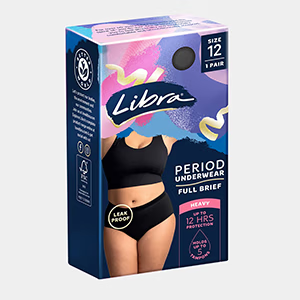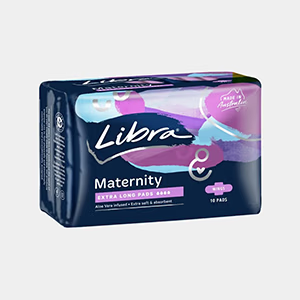Apr 26, 2023
Here’s how (and why) to track your period without an app
Tracking your period isn’t just about predicting your period and avoiding those white jeans period emergencies. The more you learn to listen to your body’s cues without relying on prompts from a period tracker app, the better you can anticipate your cycle and recognise any irregularities or changes. You’re basically a period fortune teller!
What is period tracking?
Period tracking involves making notes about your body before, during and after your period, and throughout your entire menstrual cycle. You can do it with a journal and pen, calendar entries on your phone, or any app-free method that suits you. The goal is to be consistent, so make it easy for yourself.
What are the benefits of period tracking?
Manually tracking your period and menstrual cycle allows you to learn about your body and its ebbs and flows. It’s helpful for keeping an eye on hormone-related symptoms (breakouts, moodiness, cramping, and all that fun stuff), noticing when you’re ovulating and fertile, and feeling more in tune with your body.
If you need to talk to your doctor about period-related concerns, one of the first things they’ll ask is for you to keep a diary about it. They can use your notes to identify menstrual patterns and help manage certain conditions. Similarly, if you’re planning to fall pregnant (or have trouble doing so), period tracking can highlight when your fertile window is. Handy right?
How do I track my period manually?
You can start period tracking at any time and it will take at least three months to notice patterns. This will depend on how ‘regular’ your period is. If your cycle is like clockwork, you’ll start noticing patterns in a few months. If it’s unpredictable, it can take longer to piece the puzzle together. But even the most unpredictable periods typically have some signs and regularities – you just have to learn what to look for. (More on this later.)
The way you track your period depends on the method you choose. You can keep it simple and write daily notes about what you notice physically (blood, cervical mucus, breast tenderness, cramping, pain, skin condition, bloating, digestion, etc.) and mentally (PMS, moodiness, sex drive, energy levels, sleep, focus, etc.). For example, if you always have sore boobs and feel all the feels before your period, tracking these symptoms means you can assume they’ll happen in your next cycle. If you know when these symptoms might pop up, you can prepare your comfiest loungewear set and favourite feel-good treats ahead of time.
There are a few more detailed methods of period calculation. They’re great for tracking your periods and ovulation (which can be helpful if you’re hoping to fall pregnant).
![]()
Calendar method
Use a calendar or dated diary to track period length and anticipate upcoming periods.
- Record the dates of when your period starts and ends. Take note of how many days your period usually lasts.
- When you have a few months of data, count how many days there are between the first day of your period and the day before your next period. This duration is your typcial menstrual cycle, but of course, this may fluctuate.
- You can roughly anticipate the date of your next period by starting on the first day of your most recent period, then counting the number of days in your menstrual cycle (from step two). Wherever this lands in your calendar is when your next period is due. Use the number of days your period usually lasts (from step one) to work out when it should end.
Temperature method
Measure your daily basal body temperature (BBT) using a basal thermometer to track ovulation.
- Measure and record your body temperature at the same time every day, ideally when you first wake up.
- Your normal body temperature will be around 36.5˚C. Just before you ovulate, your temperature will drop slightly to around 36.2˚C. When you are ovulating or have just finished, your temperature will rise to around 37˚C until your period comes. Then it will return to your normal body temperature.
- You will need to track your basal body temperature for at least three months to understand your changes in temperature.
Cervical mucus method
Take note of the visible changes in your cervical mucus (aka discharge) to track your ovulation and period.
- Write daily notes about the colour and texture of your cervical mucus when you notice it. It will be visible on your underwear or you can wipe your vagina with toilet paper before urinating.
- Your discharge indicates where you’re at in your menstrual cycle.
- On your period: Blood covers discharge so you won’t really see it.
- Three to four days after your period: Dry.
- Before ovulation: Discharge becomes creamy, cloudy and sticky.
- Just before ovulation: Discharge becomes wet, thin or watery.
- During or just following ovulation: Discharge becomes clear and slippery, similar to raw egg whites.
- After ovulation: Discharge goes back to being creamy, cloudy or sticky before drying up. Then, the cycle begins again.
Who would have thought keeping an eye on your discharge would be helpful in tracking your period?
Can I track my period if it’s irregular?
You may have to track your period over quite a few months (and even years), but yes! Keeping track of physical or mental changes in the lead up to your period can hep you to predict your next period.
Regardless of whether your cycle is regular to irregular, it’s important to take note of any changes to your flow as they may hint at a condition. If you think something’s up, take your notes to your doctor. Some irregularities include:
- Change in period length (longer or shorter)
- Change in bleeding (very heavy or very light)
- Change in menstrual cycle (longer or shorter)
- Missed periods
![]()
What if I want to use a period tracker app?
It’s your cycle, use what you’re most comfortable with! Clue, Flo, Ovia and Period Diary are great options and have plenty of period health and sexual health resources to check out, too. (FYI: Many apps require a monthly subscription cost to use all the features, as opposed to tracking it manually for free.)
No matter the option you choose, tracking your period and menstrual cycle is helpful for anticipating your period, knowing when you’re ovulating, and being more in touch with your body - it’s empowering!
Love, Libra x
Essity makes no warranties or representations regarding the completeness or accuracy of the information. This information should be used only as a guide and should not be relied upon as a substitute for professional, medical or other health professional advice.







